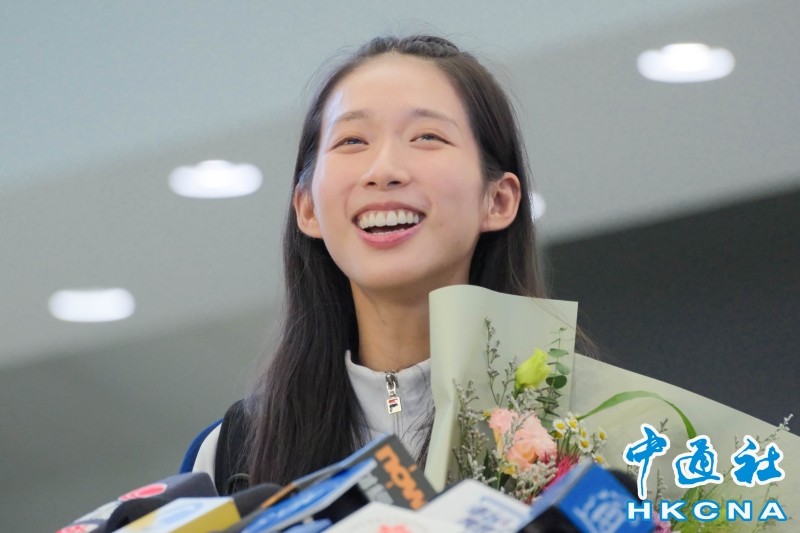“促进和保护发展权”主题边会在日内瓦举行 江旻憓发言
香港新闻网6月20日电 联合国人权理事会第59届会议期间,“促进和保护发展权”主题边会18日在日内瓦举行。边会由中国联合国协会和中国常驻日内瓦代表团共同举办,来自各国常驻日内瓦代表团、联合国驻日内瓦机构、非政府组织代表等参会。

巴黎奥运会女子个人重剑冠军江旻憓发言,全文如下(英文):
Excellencies, Distinguished Delegates,
My name is Vivian Kong and it’s an honour to be here today.
This time last year, I was counting down to my third Olympics and I was convinced that I was cursed.
I was ranked world number 1 at the time and there’s a curse in our fencing community that the world number 1 never wins the Olympics.
I had made up my mind that after 20 years of fencing, it would be my last Olympics no matter what. I was tired of measuring my self-worth based on medals.
I was ready to move on and pursue a career in youth and sports development because if my dream of being an Olympic Champion was a lost cause, then I will focus on helping other children pursue their dreams. That way, I could feel like winning every day because true success should extend beyond winning itself and for myself, but winning for others and winning together.
I was volunteering the other the day and a young girl, who was collecting a free meal from our food assistance programme, thanked us and shared, “My dream is to become an athlete, but I also want to have time to be able to help others.”
My coach used to say, whenever an athlete wins, it’s because of the athlete. When an athlete loses, it’s because of the coach. I hated it when he said that because not only did I have the best coach in the world, I also had access to top-tier medical care, specialised world-class training facilities, and resources that are not readily available to everyone, including the unconditional support and a sense of security to fail, to lose over and over again hoping I’ll win next time.
At the end of the day, winning gold is generally seen as a personal achievement no matter how hard I give credit to the people who have helped me along the way or acknowledge the socioeconomic privilege to have the right to dream.
In 1981, 97% of people in rural China lived in extreme poverty. Even in cities, it was more than 70%.
In Hong Kong, we experienced a rise in poverty amidst affluence, with increasing income inequality and a significant proportion of households living in relative deprivation.
My grandparents had to do whatever it took to put food on the table so they opened a cha chaan ting, which are affordable Hong Kong style cafes that serve Canto-Western food as a more accessible option compared to the expensive, high-end Western restaurants, which was a privilege limited to the upper class.
My grandpa’s little cha chaan ting meant that my dad and his 7 siblings were fed. My dad was the youngest son of them all, so he was the only one lucky enough to get an education.
My dad proudly became our family’s first generation university student. He studied civil engineering not because it was his dream or passion, but because it was the best way to profit from Hong Kong’s rapid development and thriving construction industry in the 1980s.
Soon, the opening up of China led to a gradual shift in manufacturing. Construction materials were increasingly sourced from the mainland, and civil engineers had to adapt to this changing landscape.
Growing up, my dad was often absent and in the Mainland most of the time so that he could make more money and fund my elite education, extra-curricular activities, and develop dreams and passions.
My grandparents and parents exercised their right to development, to participate in, contribute to, and benefit from progress so that I could have the privilege and right to dream - to not have to worry about going to bed hungry, to know what it’s like to have individual agency and to have the opportunity and freedom to unlock my full potential and pursue medals.
As athletes, we are used to the idea of “giving it our all” and “doing whatever it takes” to win.
While the Chinese translation of “giving it our all” 竭尽全力 is complimentary, when we translate “doing whatever it takes”, it becomes 不择手段, which is derogatory, closer to “by fair means or foul”, and reminds us to always balance ambition with a strong sense of values.
The Olympic` dream, should mean more than doing whatever it takes to win a gold medal. The Olympics, like the United Nations, is a global commitment to the pursuit of peace, unity and progress.
Sports can serve as a catalyst for mutual understanding, tolerance and respect. Through sports, we can reflect on what it truly means to win.
In Chinese culture, the concept of winning is closely tied to the values of harmony, mutual benefit and win-win situations. We emphasise harmony and balance, and winning is often within this framework, with the goal of achieving a positive outcome for all.
China met the poverty eradication target set out in the United Nations’ 2030 Agenda for Sustainable Development 10 years ahead of schedule.
China understands poverty. Our food is so good because past generations were familiar with true hunger. We know that the right to survival is fundamental to the realization of all other human rights. Protecting and promoting the right to development is a fundamental solution to poverty.
China promotes a global community of shared future where countries cooperate for common development. The core principle of win-win cooperation is central to China’s vision of genuine multilateralism and a multipolar world order, one that opposes unilateralism and hegemony.
Unilateral tariffs, export restrictions, and extraterritorial sanctions undermine the right to development across nations. They betray the duty of international cooperation, replacing solidarity with zero-sum thinking.
China is committed to closely link development with the common growth of the developing world, connecting the Chinese dream with the dreams of all people all over the world. Where everyone is equally empowered to unlock their full potential and become champions in their own right.
Thank you. (完)
下一篇:港股升292点 两新股暗盘升势猛
